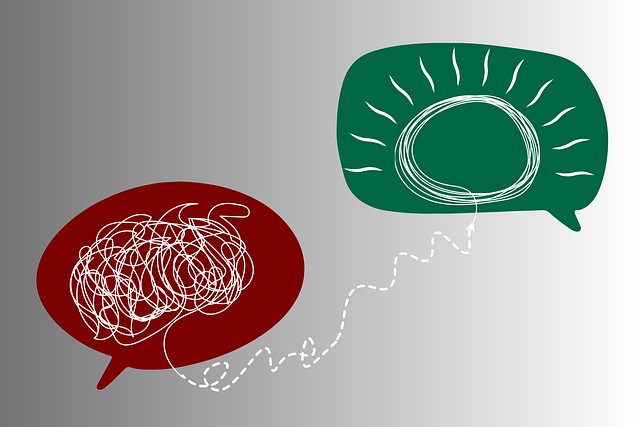Lone Tree Interpersonal Issues Therapy is an effective approach to enhancing mental well-being through positive thinking. By addressing emotional challenges, refining communication skills, and employing evidence-based techniques like CBT, this therapy cultivates resilience and promotes a positive mindset. Tools like mental wellness journaling, self-care routines, and mindfulness practices further empower individuals to manage stress and adversity constructively, fostering long-term mental health improvement, even in the face of interpersonal issues or burnout.
- Understanding Positive Thinking and its Benefits for Mental Health
- The Role of Lone Tree Interpersonal Issues Therapy in Fostering Positive Thinking
- Practical Implementation: Exercises to Cultivate a Positive Mindset
- Overcoming Challenges and Sustaining Positive Thinking Long-Term
Understanding Positive Thinking and its Benefits for Mental Health

Positive thinking is a powerful tool that can significantly impact mental health and overall well-being. It involves cultivating an optimistic mindset, focusing on the positive aspects of life, and expecting favorable outcomes. This simple yet profound shift in perspective can be a game-changer for individuals facing various challenges, including interpersonal issues, anxiety, or depression. Research suggests that positive thinking exercises can reduce stress, enhance resilience, and improve overall mental health. By encouraging clients to reframe negative thoughts and emotions during therapy sessions, Lone Tree Interpersonal Issues Therapy offers a unique approach to nurturing mental fortitude.
This practice is particularly beneficial for healthcare providers who often deal with high-stress situations, leading to potential burnout. Incorporating positive thinking exercises into their self-care routines can serve as an effective crisis intervention guidance, fostering confidence and emotional resilience. Moreover, it aligns with the broader strategy of burnout prevention, ensuring professionals maintain a healthy work-life balance while providing exceptional patient care.
The Role of Lone Tree Interpersonal Issues Therapy in Fostering Positive Thinking

Lone Tree Interpersonal Issues Therapy plays a pivotal role in fostering positive thinking by addressing underlying interpersonal and emotional challenges. This therapeutic approach is designed to help individuals navigate complex social dynamics, improve communication skills, and build healthier relationships. Through various techniques such as cognitive-behavioral therapy (CBT) and mindfulness exercises, the therapy equips clients with effective coping skills development, enabling them to manage stress and adversity more constructively.
The Mental Wellness Podcast Series Production often incorporates insights from Lone Tree Interpersonal Issues Therapy to promote inner strength development. By delving into real-life experiences and sharing practical strategies, these podcasts empower listeners to cultivate a positive mindset, enhance resilience, and improve overall mental wellness. This holistic approach ensures that individuals not only overcome interpersonal issues but also thrive in various aspects of life, making them more equipped to face future challenges with optimism and confidence.
Practical Implementation: Exercises to Cultivate a Positive Mindset

Cultivating a positive mindset is an accessible and powerful tool for anyone seeking to enhance their mental well-being, especially those navigating interpersonal issues or challenges related to mental illness. Lone Tree Interpersonal Issues Therapy offers practical exercises tailored to this end. One such exercise involves mental wellness journaling, where individuals can express their thoughts and emotions daily. By reflecting on positive experiences and grateful moments, one can retrain their brain to focus on the good, thereby reducing the grip of negative thought patterns.
Additionally, establishing a self-care routine is integral to this process. This could include regular physical exercise, adequate sleep, and engaging in hobbies that bring joy. Simple yet effective practices like mindful breathing exercises or practicing kindness towards oneself can significantly contribute to mental illness stigma reduction efforts. These strategies collectively empower individuals to take charge of their mental health, fostering a more positive outlook on life.
Overcoming Challenges and Sustaining Positive Thinking Long-Term

Overcoming challenges is a vital aspect of cultivating positive thinking that extends beyond initial motivation. It’s here that resilience building becomes paramount. When faced with interpersonal issues or personal struggles, it’s easy to fall into negative thought patterns. However, through therapy and structured programs like community outreach initiatives, individuals can learn effective coping strategies. These tools empower them to navigate difficult situations, fostering a mindset of perseverance rather than defeatism.
Long-term sustainability of positive thinking requires consistent practices and support systems. Regular participation in stress management workshops or similar organized activities reinforces the importance of self-care and emotional well-being. By integrating these initiatives into daily routines, individuals can enhance their resilience, ensuring that even when faced with life’s inevitable challenges, they have the tools to maintain a positive outlook.
Implementing positive thinking exercises, as supported by Lone Tree Interpersonal Issues Therapy, can significantly enhance mental health. By understanding the benefits and mastering practical techniques, individuals can overcome challenges and sustain a positive mindset over time. This transformative journey not only improves overall well-being but also empowers folks to navigate life’s complexities with resilience and optimism.










